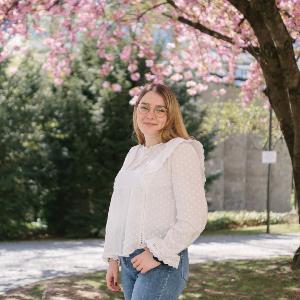Good education for everyone
28 Apr 2022
LMU student Lucinda Hyska has founded a support project in which student teachers volunteer to tutor high school students. The project is supported by the MZL.
28 Apr 2022
LMU student Lucinda Hyska has founded a support project in which student teachers volunteer to tutor high school students. The project is supported by the MZL.

LMU student Lucinda Hyska has founded a support project in which student teachers volunteer to tutor high school students.
Lucinda Hyska is a student teacher representative for high school teaching at the Munich Center for Teacher Education (MZL) and is committed to helping students with learning difficulties who cannot afford to pay for tutoring. During the Covid-19 pandemic, the LMU student founded a support project in which student teachers volunteer to tutor high school students.
How did you come up with the idea of creating a project for students to help schoolchildren?
Children from more socially disadvantaged families tend to need more support at school in order not to drop out of the education system. I’ve been concerned with questions like this for a long time: How can we provide support in schools in view of this educational issue? I want to become a teacher myself, so I’m keen to make a difference now. My own parents are not from Germany. They’ve had to work very hard, but above all we have been very lucky to get where we are now.
Getting a good education should not be a matter of luckLucinda Hyska, Student
Many people simply don’t have this luck. And anyway, getting a good education should not be a matter of luck. The problem has been exacerbated in the pandemic because distance learning puts children with learning difficulties at a disadvantage. So I thought about what could be done with a view to these problems — and that’s how I came up with this project, which aims to draw attention to the issue of ‘educational provision for all children.’ In the fall of 2021, our ‘support project’ finally got off the ground in schools.
How do the remedial classes work?
Our support project is aimed at student teachers who can offer remedial classes for schoolchildren. Currently, we offer remedial classes for the lower grades (5th-7th grade) at the Karolinen-Gymnasium, a high school in Rosenheim. This is where we started as a pilot project. Unlike in the better-known ‘Brücken.bauen’ project of the Bavarian Ministry of Education and Cultural Affairs, student teachers can get the lessons they give credited as part of their school internships thanks to the support of the MZL and the Internship Office.
The teaching takes place online. So you could say we are mitigating online teaching with online teaching. Lessons take place in small groups. Each schoolchild has a curriculum tailored to them — sometimes the student teacher will supervise only one schoolchild. They meet for 45 minutes at least once a week for a teaching session. The student teachers mainly take the schoolchildren through what they are already learning in class, explain the content again if necessary, and incorporate online tools, such as games.
It is important that the children have the opportunity to ask their questions openly and without feeling like they’re under time pressure.Lucinda Hyska, Student
What do you hope to accomplish with these remedial classes?
The primary goal is to respond to the individual children’s needs. Building a relationship of trust is usually more important than going over the subject matter for 45 minutes, as personal interaction with the children in a safe setting outside the classroom can already achieve a great deal. It is important that the children have the opportunity to ask their questions openly and without feeling like they’re under time pressure. The goal is to close learning gaps and to explain again the parts of the curriculum that they haven’t been able to understand.
How is it all organized?
I’m the organizer of the project, which means I put together all the curriculums, take all the registrations from parents, and communicate with the school, which by the way is my old high school. So I am, in a sense, the organization and communication interface. There’s quite a lot of organization to be done. But so far I have had the advantage of the registration period being during the semester break. So I’ve been able to devote myself to the project after the exams. Being able to communicate via WhatsApp is a great help. We have a shared group where any questions can be asked, which means they are not constantly being repeated. Communication does take up a lot of time, of course. But I enjoy it very much and the topic is close to my heart. That’s why I’m so happy to be doing this work.
How many schoolchildren and student teachers are participating in the support project?
In the first half of the year, a total of 54 schoolchildren registered. In the second half of the year, the number almost doubled to 85, almost as many as there are in a whole grade. And among the student teachers, there were 32 registrations in the first half of the year and 37 in the second. We have received so much good feedback and apparently word has already spread about the support project. I have to say, we were all very positively surprised by the numbers.
What are your hopes for the future of the project?
I’m thinking big: I really hope that cooperation between universities and schools will be strengthened. After all, student teachers want to become teachers. So why shouldn’t we already teach and support schoolchildren during our studies? I think it would be great if this collaboration could be implemented and we could expand the project to other schools and school types. Either as a part-time job or as a module within an internship. There are only positives for everyone. That would be my dream.